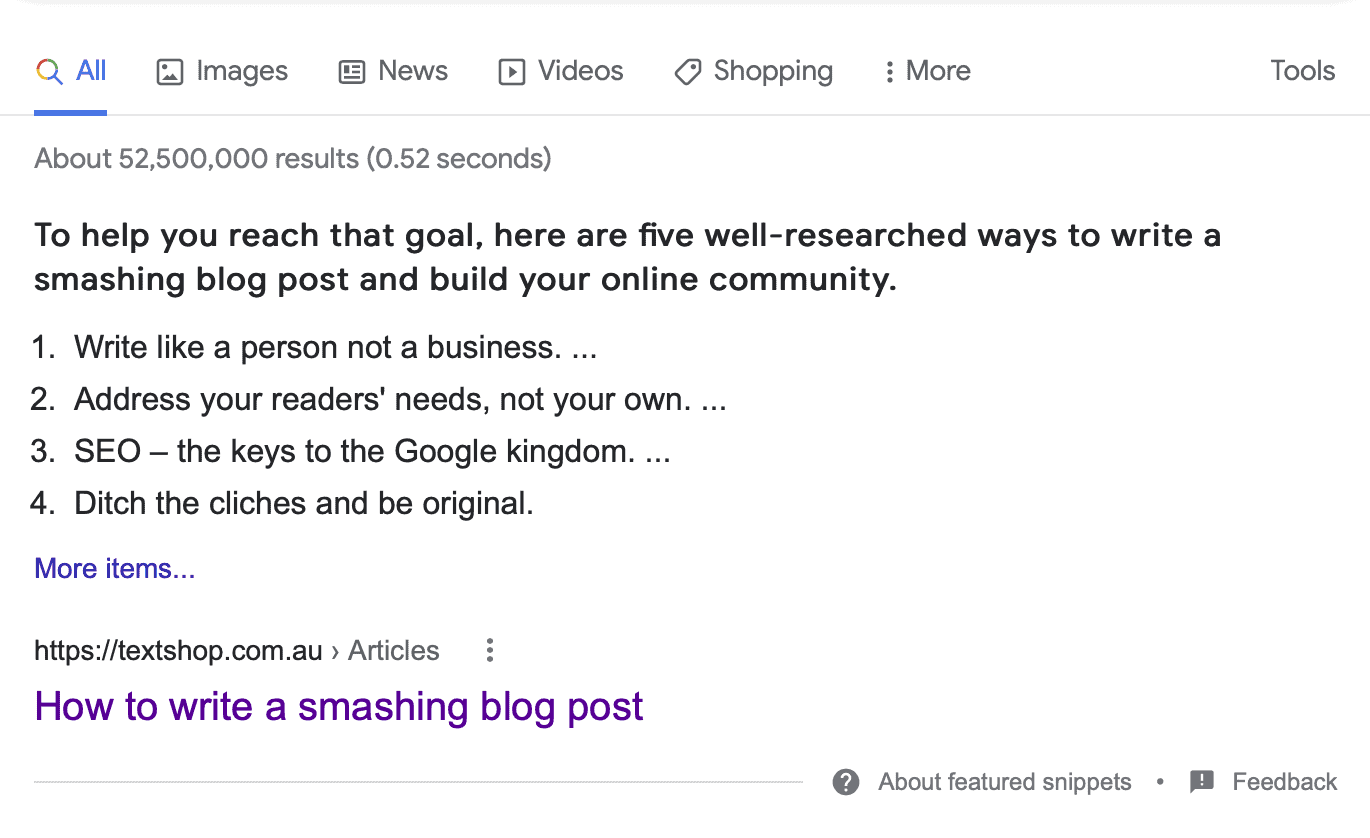It’s almost impossible to run a business in 2022 without an online presence of some kind. Currently, there are about 12–24 million ecommerce sites around the world.
With those numbers, businesses can expect a hefty amount of competition no matter their market. So, what’s a business owner got to do to stick out? One way to stand out is to start a blog.
If you’re asking yourself, ‘Does my business need a blog?’ the answer is almost always yes.
No, we’re not talking about a website resembling the online journal you kept as a teenager. Those days of blogging are long gone, and a blog now is defined as a regularly updated web page that fulfils personal or business needs.
Blogging is one of the most powerful tools a business owner today can utilise to generate organic website traffic, which you can turn into sales.
Still on the fence? Let’s look at some of the top benefits of a blog and continue to answer that question: Does my business need a blog?
To start, you’ve probably researched your competition already.
No matter your line of business, there are at least a few other websites selling a similar product.
Companies that have a blog will get 55% more visitors to their page than a business without one. It should be a no-brainer that this type of traffic can ultimately lead to more sales.
Customers searching online are more likely to choose a brand with more information on their website, than one with only a simple product description.
A blog will also keep them reading and on your page for a longer amount of time.
The term ‘customer experience’ has replaced ‘customer service’ in the world of online business.
If you’re unfamiliar with it, the term customer experience is all-encompassing of every single step in the process of a sale.
It starts the second they find your website in a search engine and carries on until well after they have the product. Blogging is an essential part of the customer experience, and we’ll tell you why.
If you answered the question ‘Does my business need a blog’ with a yes, then you’re opening a dialogue with customers. Including a comment section at the bottom allows people to engage with your post and you can directly reply to them.
Pairing this tactic with other forms of social media creates a personal connection that is likely to create a loyal customer base.
Search engine optimisation, or SEO, is crucial for online marketing.
SEO is the practice of optimising your website pages to make them rank in high positions in search results.
Businesses do this in a blog by incorporating high-ranking keywords. Search engines pick up on the keywords of an optimised blog and will show them in results.
For example, if your website is selling probiotic drinks, you may want to have blogs that have keywords such as ‘best probiotic drinks’ throughout the content so Google picks it up.
Think about any time you’ve searched for something online. You most likely typed in a high-ranking keyword without even realising it!
Another way to rank higher in searches is inbound links. Inbound links are links on other blogs and websites that bring traffic to your page.

Companies that blog will have around 97% more inbound links. That link right there is an inbound link to another website. You’re welcome!
When your blog shows up as a resource link on another web page, it shows credibility. Search engines will pick up on that and know your website has what it takes to be shown in search results.
Having a blog is a great way to increase your credibility with informative, well-researched content for others to use.
Not only will this be useful for SEO, but it also shows your customer base that you’ve taken the time to research relevant content for your product.
Knowing they can visit your website for related information will keep them coming back.
A blog is a valuable marketing tool, especially if you combine it with a content marketing strategy.
To create a long-life business blog with its own community of readers, you need to do the following:
Develop a content marketing strategy and make sure you use it.
Always optimise each blog post for Google. Without SEO, Google will assign your post to the backwaters and only the very determined will find it.
Remember this. Your blog posts need more than text. Think bullet lists, tables, videos, infographics and photos.
Update your blog posts every so often. Add updated statistics, images and links. When you’re done, submit the blog post for indexing through your Google Search Console.
Let me share something with you.
My blog post ‘How to write an awesome blog post’ wasn’t ranking on Google.
I’d put a lot of work into this post and knew it was good. So how could I get more people to read it? How could I get it to rank more highly in the search engine pages?
It’s never a good idea to change the title of a blog post when you update it because it will cause broken links wherever it’s been posted. But this post wasn’t an oldie, and I was confident I could update the title in the places I’d posted it.
I did a new keyword research for a niche longtail keyword. I wanted a keyword with a density under 40. Above 40 is notoriously difficult to rank for. I needed a narrowly focused longtail keyword that I could work with.
I found the keyword I was looking for and this is what I did next:
Changed the blog post title to How to write a smashing blog post, to include my longtail keyword.
Update the numbered list of headings that runs throughout blog post. Why? Because Google has a preference for bullet lists when selecting featured snippets.
Worked through the blog inserting my new keyword into paragraphs, headings and alt text on my images.
Proofread the blog post and submitted it to Google Search Console for indexing.
Guess what happened next? My blog post shot straight into Google’s stratosphere!
Within one week, my updated blog post was ranking #1 on Google for my new keyword, AND it was the new featured snippet!
And here it is! How to write a smashing blog post on prime Google real estate.
You can’t buy this authoritative space at the top of page one. All paid advertising and top ranked articles are pushed down the page.

When you have a new blog, what better place to promote it than your social media accounts?
If you’ve hired a social media manager, they can create content around the blog post to encourage viewers to read it.
Other content, such as videos to accompany the blog, can be created including interviews, instructional videos or whatever will relate to your blog content.
The blog itself is something your followers can share on their own social media platforms, which will increase your visibility organically.
How many times have you been searching for something, ended up on an informative blog that resulted in you signing up for their email list or free trial?
If you liked the free trial, you most likely went back and purchased the product, right? This strategy totally works, and it’s referred to as lead generation.
Lead generation is the process of generating consumer interest for a product or service with the goal of turning that interest into a sale.
That free trial will most likely turn into a permanent subscription if enough interest was gained from your blog, just like that free trial you bought months ago.
Once your blog is gaining a substantial amount of traffic, it’s a powerful marketing tool.
Your posts should consistently have a call to action, which will generate all of those precious leads.
The call to action should, of course, be related to your products and get them to sign up for a trial, or other freebies to get email addresses and other contact information.
To sum up our question: Does my business need a blog? Yes, yes it does.
The benefits of generating SEO blog content are endless. Even if your website isn’t flooded with traffic overnight, consistently producing high-ranking blog content is never going to hurt your business.
You don’t have to be Shakespeare to write a compelling blog. Well-researched information in simple language will work.
Sharon is a content writer and award-winning editor. After acquiring two masters degrees (one in education and one in editing and comms) she worked in the publishing industry for more than 12 years. A number of major publishing accomplishments came her way, including the eighth edition of Cookery the Australian Way (more than a million copies sold across its eight editions), before she moved into corporate publishing.
Sharon worked in senior roles in medical colleges and educational organisations until 2017. Then she left her role as editorial services manager for the corporate arm of a university and founded Textshop Content – a content writing and copyediting agency that provides services to Australia’s leading universities and companies.
